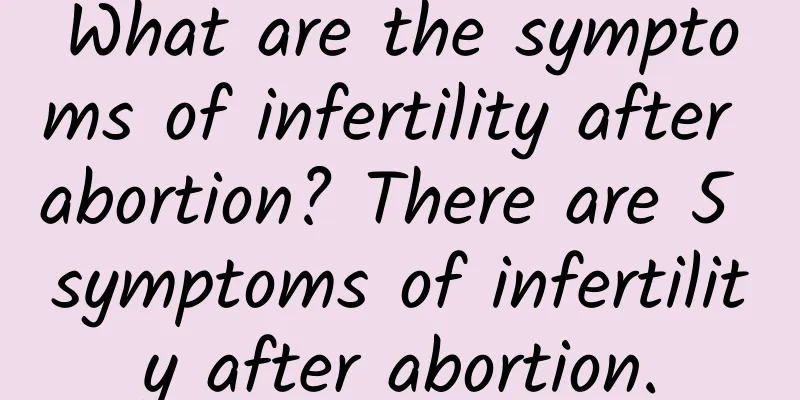What are the symptoms of infertility after abortion? There are 5 symptoms of infertility after abortion.

|
Abortion is very harmful to the body, especially it affects the health of the uterus. In fact, many female friends who have had abortions cannot successfully get pregnant and have children, which is a big blow to them. Therefore, it is necessary to detect this phenomenon in time so that you can rush to the hospital for examination, diagnosis and treatment as soon as possible, and you can't delay the time. So what are the symptoms of infertility after abortion? 1. Menstrual changes: including menstrual cycle changes, amenorrhea, dysmenorrhea and other symptoms. Menstrual cycle changes refer to early or delayed menstruation, excessive or insufficient menstrual flow, and prolonged menstruation. Experts from the Chinese Abortion Network said that menstrual cycle changes are common in patients with corpus luteum insufficiency and endometrial inflammation, and amenorrhea causes a large proportion of infertility. Dysmenorrhea is mainly caused by diseases such as endometriosis, pelvic inflammatory disease, uterine fibroids, uterine dysplasia, and abnormal uterine position. 2. Fever or edema during menstruation: A small number of women experience a series of symptoms periodically before and after menstruation, including "fever during menstruation", "edema during menstruation", "breast swelling before menstruation", "headache during menstruation", "diarrhea and oral erosion during menstruation", "facial acne before menstruation", "depression or irritability during menstruation", etc. These symptoms are often caused by endocrine disorders and luteal dysfunction, which can often lead to infertility. 3. Abnormal leucorrhea: When there is vaginitis, cervical erosion, endometritis, adnexitis, pelvic inflammatory disease and various sexually transmitted diseases, the leucorrhea will increase, be yellow in color, have an odor, be tofu-like or watery, or be accompanied by vulvar itching and pain, etc., and these diseases can affect conception to varying degrees. 4. Galactorrhea: Milk leaks out of the breasts spontaneously or after squeezing during the non-lactating period. This often indicates hypothalamic insufficiency, pituitary tumors, prolactinomas, primary hypothyroidism, chronic renal failure, etc. It can also be caused by contraceptives and antihypertensive drugs such as reserpines. Galactorrhea is often combined with amenorrhea and leads to infertility. 5. Abdominal pain: Chronic lower abdominal pain, bilateral abdominal pain or lumbosacral pain often occurs when there is pelvic inflammatory disease, myometritis, oophoritis, endometriosis, uterus, ovaries, or tumors. |
<<: What are the TCM syndrome differentiation and treatment methods for female cervicitis?
Recommend
Will cervical erosion affect normal pregnancy?
Most women will have varying degrees of cervical ...
Poor skin condition during weight loss period, beauty porridge regulates endocrine
Are you still struggling with obesity? Don’t lose...
Does mild cervical erosion need treatment? There are three types of cervical erosion.
When estrogen is secreted in women, it will cause...
How much does it cost to treat Bartholinitis?
The key to treatment is early stage. Some patient...
What are the symptoms of postmenopausal cervical adhesions?
Symptoms of postmenopausal cervical adhesions inc...
What are the main symptoms of cervical erosion?
Cervical erosion is a common gynecological diseas...
What are the causes of recurrence of cervical erosion?
Although cervical erosion is a common gynecologic...
How to prevent endometrial thickening after menopause
It is still very important to prevent postmenopau...
What is the best medicine for women with cervical erosion? Analysis of different medications for cervical erosion
Many women will suffer from cervical erosion. The...
A must-see for brides-to-be! Get rid of your sleeves in 15 minutes
When brides put on their wedding gowns, they are ...
Experts answer common causes of white lesions on the vulva
Vulvar leukoplakia is a gynecological disease tha...
The symptoms of cervical erosion can directly reflect the patient's condition
Cervical erosion is extremely harmful to the huma...
3 necessary examination methods to diagnose ectopic pregnancy
In addition to diagnosing the patient's sympt...
Health food therapy for patients with vaginitis
Patients with vaginitis should not ignore the imp...
Does uterine fibroids require surgery? Treatment methods for uterine fibroids
We often hear that there is surgical treatment fo...









